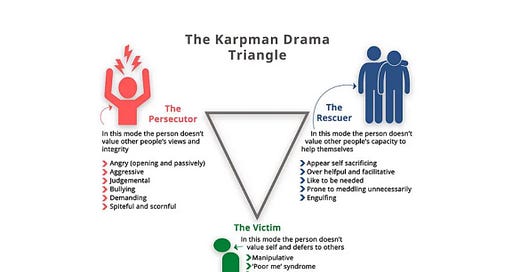🥋 Kamala's KDT Jujutsu : 🎭 Defeating Trump's Drama Triangle🔺
🔍 Understanding the Karpman Drama Triangle: 🧠 A Key to Political Strategy
😽 Keepin’ It Simple Summary for Younger Readers
👧🏾✊🏾👦🏾
Kamala Harris is like a karate 🥋 expert in politics, using clever tricks 🎩 to not get pulled into fights with Donald Trump. Instead of arguing back when he insults her, she focuses on her plans 📋 to help people. This means she doesn’t give him the attention 👀 he wants, making it harder for him to play the “victim” card 🎭. If everyone pays attention to what matters, like helping others 🤝, it can change how elections go 🗳️.
KDT Jujutsu: How Kamala Uses Karpman's Drama Triangle to Defeat Trump
In the high-stakes world of political campaigns, the strategies employed by candidates can make or break their chances of success. The 2024 presidential race is shaping up to be a fascinating case study in the use of psychological tactics, particularly the Karpman Drama Triangle (KDT).
Developed by psychologist Stephen Karpman in 1968, the KDT is a social model that maps out the dysfunctional roles people play during conflicts: the Persecutor, the Rescuer, and the Victim.
Enter Kamala Harris, the Democratic candidate challenging incumbent President Donald Trump. Harris seems to be employing a form of "KDT Jujutsu" - using her understanding of the Drama Triangle dynamics to turn Trump's own tactics against him.
Asha Rangappa, a lawyer, former FBI agent, and current Director of Admissions at Yale University's Jackson Institute for Global Affairs, recently highlighted this concept. In a series of insightful tweets, Rangappa outlined how the KDT model can be applied to understand Trump's behavior and the dynamics of his supporters and critics. She observed that Trump defaults to the Persecutor role but quickly shifts to the Victim when challenged, engaging his supporters as Rescuers against his perceived Persecutors.
Rangappa astutely pointed out that the way to break this cycle is to refuse to play any of the roles in the triangle. She noted that the Harris campaign seems to be taking this approach, denying Trump the foils he needs to perpetuate his drama. Rangappa's analysis provides a valuable framework for understanding the psychological games at play in the 2024 race.
Trump's Default: Persecutor and Victim
As Rangappa observed, Trump's modus operandi is to operate from the Persecutor position. He goes on the offensive, attacking his opponents with demeaning nicknames and allegations of unfair treatment. However, when challenged, Trump quickly shifts into the Victim role, claiming he is being unfairly targeted and subjected to "witch hunts". This rallies his base to come to his defense as Rescuers.
In the KDT, occupying the Victim role is desirable because it garners attention and sympathy from both Rescuers and Persecutors. Trump exploits this by constantly claiming victimhood, even while persecuting others. It's a manipulative tactic to avoid accountability and gain support.
Harris's Counter: Refusing to Play
Here's where Harris's "KDT Jujutsu," illuminated by Rangappa's analysis, comes into play. By refusing to engage in the drama triangle and play the roles of Persecutor or Rescuer, Harris denies Trump the opportunity to play Victim.
When Trump attacks, Harris does not respond in kind. She does not take on the Persecutor role, which would validate Trump's Victimhood. Nor does she rush to his defense as a Rescuer, which would also feed into the dysfunctional dynamic.
Instead, Harris sidesteps the Triangle altogether. She stays focused on her own message and agenda, refusing to be baited into Trump's drama. This leaves Trump without a foil to play off, disrupting his usual pattern.
Harris's approach is a form of political aikido, using Trump's own drama-seeking momentum against him. By not engaging, she conveys that Trump's antics are beneath her and unworthy of attention. It's a powerful way to defuse the conflict without getting sucked in.
Lessons for Media and Voters
Rangappa also highlighted lessons for the media and voters. When the media extensively covers Trump's claims of persecution, they inadvertently validate his Victim status and perpetuate the drama. If the media instead focuses on the facts and policies rather than the drama, it would go a long way towards breaking the cycle.
Similarly, if voters refuse to be drawn into rescuing or persecuting Trump and instead assess the candidates on their merits, it would defuse the power of the KDT dynamics.
As the 2024 campaign unfolds, watch for Harris's continuing use of "KDT Jujutsu," a strategy illuminated by Asha Rangappa's insightful analysis. By understanding the psychological games at play, Harris can strategically refuse to play and, in so doing, undermine their effectiveness. It's a fascinating approach that could be the key to defeating Trump's political theatre.
In the end, the candidate who can rise above the drama and stay focused on the real issues will be the one who truly serves the American people. Harris seems to understand this, and her "KDT Jujutsu" could be a game-changer. The 2024 election may well be determined by who masters the art of the Karpman Drama Triangle - or better yet, as Rangappa suggests, who transcends it altogether.






